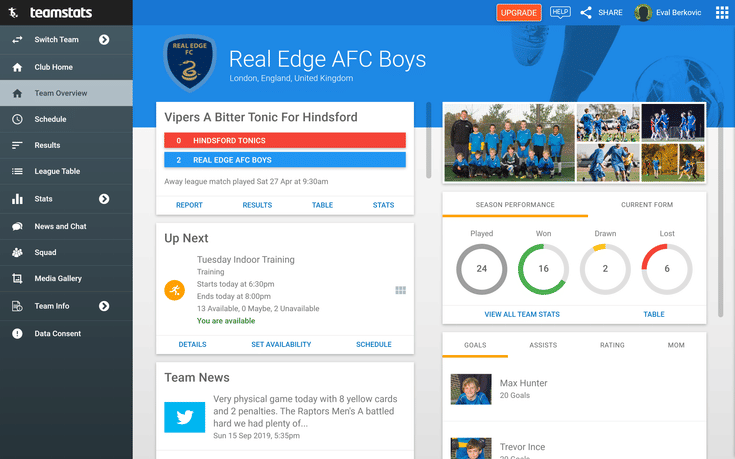Embarking on a football coaching journey at Level 1 opens doors to developing the next generation of talented players across the UK. The FA Level 1 in Coaching Football qualification serves as the foundational stepping stone for aspiring coaches who wish to create safe, engaging environments for young footballers. On average, coaches can complete the required modules for a Level 1 qualification in approximately 2-3 hours, making it an accessible starting point for those with limited time.
This entry-level certification equips new coaches with essential knowledge about introducing players to the beautiful game, often referred to as soccer in some parts of the world. The course covers crucial elements including demonstration techniques, practical teaching methods for both attacking and defensive positions, and strategies for designing age-appropriate practices. Candidates must complete eight e-learning modules through the FA's Learning Management System as part of their qualification journey.
For those wondering about requirements, the FA coaching pathway typically specifies a minimum age for participation, ensuring coaches have sufficient maturity to handle the responsibilities of guiding young players. The Level 1 course provides outline knowledge that enables holders to confidently introduce football fundamentals while creating a fun and developmental atmosphere for players of various abilities.
Getting Started with FA Level 1 Coaching
The FA Level 1 in Coaching Football, now called "Introduction to Coaching Football", is the first formal step on the coaching pathway for aspiring football coaches in the UK. This entry-level qualification provides essential knowledge and skills to create safe, enjoyable football environments for players.
Understanding the FA Coaching Pathway
The England Football coaching pathway begins with the free FA Playmaker course, which serves as an introduction to coaching basics. The next step is the Level 1 qualification, officially titled "Introduction to Coaching Football". This course is designed for those who want to start coaching a local team or develop their skills in a more structured way.
After completing Level 1, coaches can progress to more advanced qualifications based on their specific interests and career goals. The pathway is structured to allow gradual skill development and specialisation in different areas of coaching expertise.
The FA has designed this progressive system to ensure coaches at all levels have appropriate knowledge and can deliver age-appropriate sessions for their players.
Course Prerequisites and Minimum Age Requirements
To enrol in the FA Level 1 coaching course, candidates must be at least 16 years old. There are no formal football qualifications required beforehand, though completing the free FA Playmaker course is recommended as valuable preparation.
Candidates need a reasonable level of fitness to participate in practical sessions. Basic football knowledge is helpful but not mandatory, as the course teaches fundamental coaching principles.
All applicants must complete a criminal background check (DBS check) as they'll be working with young people. Some County FAs may have additional local requirements.
Registration typically opens on the first day of each month through the England Football Learning platform, where the introduction module and pre-course questionnaire must be completed first.
Overview of Course Duration and Structure
The Introduction to Coaching Football course combines online learning with face-to-face practical sessions. The entire qualification typically takes 20-30 hours to complete, spread over several weeks.
The course structure includes:
- Online modules: Self-paced theory learning covering coaching fundamentals, safeguarding, and session planning
- Practical workshops: Hands-on training where candidates apply what they've learned
- Assessment components: Both theoretical knowledge checks and practical coaching demonstrations
Learners access the first module, the Introduction, at the beginning of the month. This includes a pre-course questionnaire to gauge existing knowledge.
The content focuses on creating age-appropriate practices, understanding basic football principles, and ensuring sessions are both safe and enjoyable. Unlike soccer coaching in other countries, the FA approach emphasises player development through engagement and appropriate challenge rather than just technical instruction.
Core Coaching Skills and Player Development
Effective football coaching at Level 1 requires mastery of fundamental skills that create structured learning environments while understanding how players develop over time. Successful coaches build practices that engage players, recognise developmental stages, and implement progressive training methods.
Learning to Conduct Effective Coaching Sessions
Planning is the cornerstone of productive coaching sessions. A well-structured session typically follows the FA's recommended format: a warm-up, technical practice, skill development, and small-sided games. Each component should flow logically to the next.
Effective coaches maintain high activity levels by minimising queue time and maximising ball contacts. Using the "STEP" principle (Space, Task, Equipment, People) allows coaches to modify activities to match player abilities.
Communication is crucial during sessions. Clear, concise instructions help players understand expectations quickly. Demonstrations often work better than lengthy explanations, particularly with younger players.
The "freeze" technique—momentarily pausing play to highlight coaching points—can be extremely effective. This allows players to visualise positions and solutions within the actual game context.
Fostering Young Players' Progression
Young footballers develop at different rates, requiring coaches to recognise and respond to individual needs. Technical fundamentals should be prioritised over tactical complexity in early development stages.
The FA recommends a 70:30 practice-to-game ratio for younger players. This balance provides ample time for skill development while maintaining the enjoyment factor through competitive play.
Positive reinforcement encourages continued participation and effort. Praise specific actions rather than using generic encouragement to help players understand exactly what they've done well.
Key developmental areas include:
- Ball mastery and control
- Basic passing techniques
- Movement awareness
- Simple decision-making
- Foundational physical literacy
Creating an environment where mistakes are viewed as learning opportunities rather than failures is essential for player progression.
The Long-Term Player Development Model
The Long-Term Player Development (LTPD) model provides a framework that acknowledges football development occurs over many years. It recognises distinct phases aligned with physical, mental, and social development.
LTPD emphasises age-appropriate activities rather than applying adult training methods to children. For instance, 5-8 year-olds focus on fundamental movements and fun; 9-12 year-olds develop technical skills; teenagers begin tactical understanding.
In the UK, this approach is sometimes called the "four-corner model" covering:
- Technical/tactical development
- Physical development
- Psychological development
- Social development
Patience is crucial in LTPD. Many coaches (especially in grassroots soccer) mistakenly rush development by emphasising team tactics over individual skills, potentially limiting long-term potential.
The model encourages coaches to focus on process over results. While winning provides motivation, player improvement remains the primary measure of coaching success in early development phases.
Technical Skills and Tactical Knowledge
At Level 1 coaching, developing players' fundamental abilities and game understanding forms the foundation for future success. Coaches must focus on teaching proper techniques while building awareness of key rules that govern play.
Mastering Key Football Techniques
Dribbling is a fundamental skill that Level 1 coaches must teach with precision. Players should learn to maintain close ball control using both feet, practising at different speeds and with directional changes. This builds confidence and creates attacking opportunities.
Shooting requires proper technique with emphasis on striking the ball cleanly. Coaches should focus on body position, non-kicking foot placement, and follow-through. Regular practice from various distances helps players develop consistency.
Defending involves both individual and collective skills. Teach players to adopt the correct stance - side-on, knees bent, and ready to move. Proper tackling technique is crucial, emphasising timing and safety.
Heading instruction must prioritise safety while teaching correct form. Players should learn to make contact with the forehead while keeping eyes open and neck muscles strong.
Understanding the Laws of the Game
The offside rule represents one of football's most misunderstood laws. Level 1 coaches should explain it clearly with practical demonstrations to help players recognise offside positions and their tactical implications.
Fouls and misconduct rules need thorough explanation. Distinguish between direct and indirect free kicks while clarifying what constitutes careless, reckless, and excessive force challenges.
The advantage rule allows play to continue when the fouled team benefits. Coaches should help players recognise when to expect advantage and how to maintain concentration during these moments.
Restart procedures include throw-ins, goal kicks, and corner kicks. Each has specific requirements that players must understand both for execution and strategic purposes.
Health, Safety, and Club Administration
The foundation of effective football coaching extends beyond tactical knowledge to encompass crucial responsibilities in health, safety and administrative duties. These elements ensure not only player wellbeing but also the smooth functioning of club operations.
FA Emergency Aid and Safeguarding Children
The FA Emergency Aid qualification is mandatory for all Level 1 coaches in the UK. This training equips coaches with vital skills to respond to injuries and medical emergencies that may occur during training or matches. Coaches learn how to assess situations quickly, provide basic first aid, and recognise when to seek professional medical assistance.
Safeguarding children remains a paramount concern in grassroots football. All coaches must complete the FA Safeguarding Children workshop, which covers identifying signs of abuse, appropriate communication with young players, and proper reporting procedures.
The FA requires that both qualifications be updated every three years to ensure coaches remain current with best practices. These certifications are non-negotiable requirements for anyone coaching youth teams.
Effective Club Administration Practices
Efficient club administration underpins successful football programmes at all levels. Level 1 coaches need to understand basic administrative responsibilities including:
- Maintaining accurate player registration records
- Ensuring proper completion of match day paperwork
- Managing team communications with parents and players
- Coordinating kit and equipment requirements
Many grassroots clubs now utilise digital platforms for streamlining administrative tasks. These systems help manage attendance, collect payments, and distribute important information.
Coaches should familiarise themselves with their club's specific administrative procedures and chain of communication. Understanding these processes ensures smooth operations and allows coaches to focus more time on actual coaching activities.
Assessment and Refresher Courses
The assessment process for Level 1 coaches includes practical demonstrations of coaching ability alongside written examinations covering health, safety and administrative knowledge. Assessors evaluate coaches on their ability to:
- Create safe training environments
- Demonstrate proper emergency protocols
- Show understanding of safeguarding responsibilities
- Display basic knowledge of club administration requirements
Refresher courses are essential for maintaining credentials and staying updated with evolving best practices. The FA recommends that coaches participate in continuous professional development beyond the minimum requirements.
Many experienced coaches note that these refresher sessions often provide valuable networking opportunities with peers. In the rapidly evolving world of football (or soccer, as it's known internationally), staying current with health and safety protocols represents a professional responsibility for all coaches.














